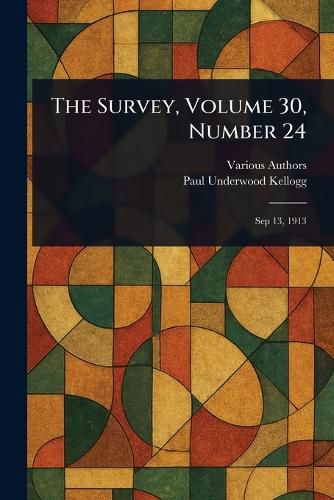Readings Newsletter
Become a Readings Member to make your shopping experience even easier.
Sign in or sign up for free!
You’re not far away from qualifying for FREE standard shipping within Australia
You’ve qualified for FREE standard shipping within Australia
The cart is loading…






This title is printed to order. This book may have been self-published. If so, we cannot guarantee the quality of the content. In the main most books will have gone through the editing process however some may not. We therefore suggest that you be aware of this before ordering this book. If in doubt check either the author or publisher’s details as we are unable to accept any returns unless they are faulty. Please contact us if you have any questions.
Explore the social landscape of early 20th-century America with "The Survey, Volume 30, Number 24, Sep 13, 1913," a vital periodical offering a window into the era's pressing concerns. This meticulously prepared print republication delves into United States social conditions, providing a detailed snapshot of urban life and the burgeoning field of social reform.
Authored by various contributors, this volume examines the challenges and complexities of welfare and societal well-being. It offers insights into the sociological landscape of the time, capturing the debates and developments surrounding social work and the evolving understanding of urban sociology.
Ideal for readers interested in the history of social sciences, this volume of "The Survey" serves as a valuable resource for understanding the roots of contemporary discussions on social justice and the enduring quest for a more equitable society. Discover the critical perspectives that shaped early American social policy and continue to resonate today.
This work has been selected by scholars as being culturally important, and is part of the knowledge base of civilization as we know it.
This work is in the public domain in the United States of America, and possibly other nations. Within the United States, you may freely copy and distribute this work, as no entity (individual or corporate) has a copyright on the body of the work.
Scholars believe, and we concur, that this work is important enough to be preserved, reproduced, and made generally available to the public. We appreciate your support of the preservation process, and thank you for being an important part of keeping this knowledge alive and relevant.
$9.00 standard shipping within Australia
FREE standard shipping within Australia for orders over $100.00
Express & International shipping calculated at checkout
This title is printed to order. This book may have been self-published. If so, we cannot guarantee the quality of the content. In the main most books will have gone through the editing process however some may not. We therefore suggest that you be aware of this before ordering this book. If in doubt check either the author or publisher’s details as we are unable to accept any returns unless they are faulty. Please contact us if you have any questions.
Explore the social landscape of early 20th-century America with "The Survey, Volume 30, Number 24, Sep 13, 1913," a vital periodical offering a window into the era's pressing concerns. This meticulously prepared print republication delves into United States social conditions, providing a detailed snapshot of urban life and the burgeoning field of social reform.
Authored by various contributors, this volume examines the challenges and complexities of welfare and societal well-being. It offers insights into the sociological landscape of the time, capturing the debates and developments surrounding social work and the evolving understanding of urban sociology.
Ideal for readers interested in the history of social sciences, this volume of "The Survey" serves as a valuable resource for understanding the roots of contemporary discussions on social justice and the enduring quest for a more equitable society. Discover the critical perspectives that shaped early American social policy and continue to resonate today.
This work has been selected by scholars as being culturally important, and is part of the knowledge base of civilization as we know it.
This work is in the public domain in the United States of America, and possibly other nations. Within the United States, you may freely copy and distribute this work, as no entity (individual or corporate) has a copyright on the body of the work.
Scholars believe, and we concur, that this work is important enough to be preserved, reproduced, and made generally available to the public. We appreciate your support of the preservation process, and thank you for being an important part of keeping this knowledge alive and relevant.